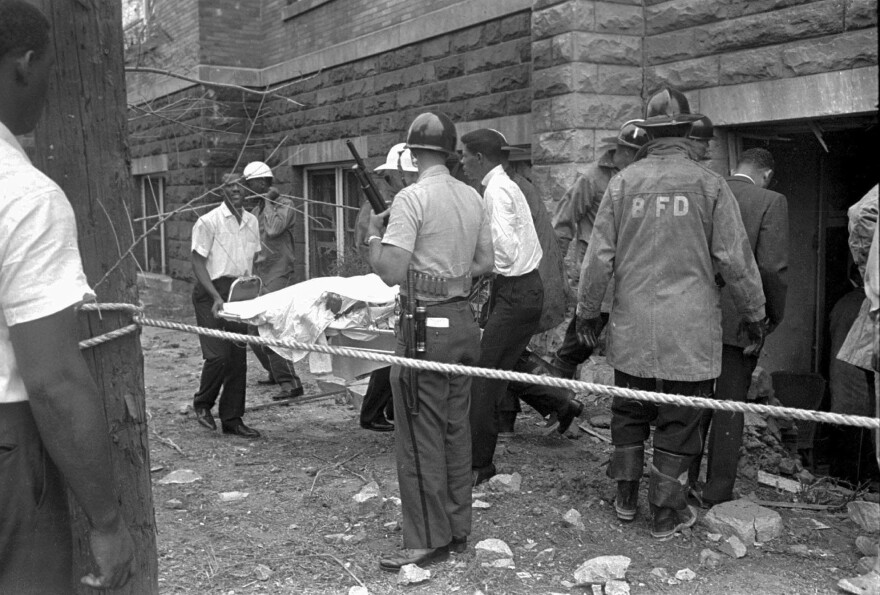Alabama will mark the 60th anniversary of the 1963 bombing at 16th Street Baptist Church that killed four girls. Lisa McNair, the sister of one of the victims, said that as the anniversary is remembered, she hoped people will think about what they can do to combat hate. McNair is worried about a current political climate where she said where politicians seem to purposely stoke division. As an adult, McNair met and forged an unlikely friendship with one of the suspect's daughters. The two are linked by tragedy_ born on opposite sides of one of the most horrific events of the civil rights movement — but share a united message to speak out against hate.
The two are linked by tragedy— born on opposite sides of one of the most horrific events of the civil rights movement — but share a united message to speak out against hate. As the nation marks the 60th anniversary of the Sept. 15, 1963, bombing on Friday, McNair said she wants people to remember what happened and think about how they can prevent it from happening again.
"People killed my sister just because of the color of her skin," McNair said. "Don't look at this anniversary as just another day. But what are we each going to do as an individuals to try to make sure that this doesn't happen again," McNair said.
The dynamite was placed outside 16th Street Baptist Church under a set of stairs. The girls were gathered in a downstairs washroom before Sunday services when the blast exploded. The explosion killed 11-year-old Denise McNair, and Cynthia Wesley, Carole Robertson, and Addie Mae Collins, all 14. A fifth girl, Sarah Collins Rudolph, the sister of Addie Mae, was in the room and was severely injured — losing an eye to the explosion— but survived.
The bombing came during the height of the civil rights movement, eight months after then-Gov. George Wallace pledged, "segregation forever" and two weeks after the Rev. Martin Luther King Jr. delivered his iconic, "I Have a Dream" speech in Washington.
Three Ku Klux Klansmen were eventually convicted in the blast: Robert Chambliss in 1977; Thomas Blanton in 2001; and Bobby Frank Cherry in 2002.
Fields' father Charles Cagle was one of the three men, along with Chambliss, arrested for questioning shortly after the bombing. Cagle was never charged. He was convicted on a misdemeanor charge of illegal possession of dynamite. But his conviction was later overturned.
Fields, now 64, was a toddler at the time of the bombing. She said she remembers her father, who died several years ago, as being filled with hatred and bitterness toward Black people. Racial slurs were common, she said, and she remembers being encouraged to hate Black classmates. She credits God for putting her preacher grandfather in her life and showing her another way.
"The most important thing to me is that my children will never know that hate that I've known," Fields said.
McNair, 58, was born a year after her sister was killed and said her parents lived with an unimaginable sorrow.
"My mother, when we were little would often take us with her to the cemetery, and sometimes she would just be there and she would cry, or sometimes she would just sit and stare," McNair said.
She wrote about her life in the aftermath of the bombing in her book, "Dear Denise: Letters to the Sister I Never Knew."
She said she first heard of Fields when she learned both planned to be at the same church program, and that Fields wanted to meet her. McNair was hesitant.
"Originally, I didn't really want to meet her," McNair said. "I was kind of nervous about it, even though she didn't do it. It was almost like meeting the person who killed your sister in a way. You're trying to figure out, how should I feel about this?"
The two eventually met at another church where Fields was speaking. McNair listened from a pew. When she finished, the two women embraced and cried, McNair wrote in her book.
"I was extremely, extremely nervous. She had every right not to accept me, but she did," Fields remembered.
McNair said she saw that Fields was genuine. Fields, now a grandmother with Black children and mixed-race grandchildren, said she didn't talk about the bombing for a long time but now thinks it is important. "How is it ever going to change in the world if we're not honest?" she said.
McNair is worried about a current political climate where she said politicians seem to purposely stoke division. There are lesson for today in what happened 60 years ago, she said.
"So much hate, so much racism is coming back up. That's the thing that upsets me and saddens me, that we should have gotten further along. I think we're going backwards instead of going forward," McNair said.
Her grandmother kept a small box, given to the family by the funeral home, of the items found with Denise — patent leather shoes, a pocketbook, a dainty handkerchief. During a recent speech in Montgomery, Alabama, McNair showed a photo of another item from the box. It was a rock-size chunk of concrete that was embedded in Denise's head and killed her.
"It shows that racism can kill. Hateful words can kill. And this is a tangible piece of that," McNair said.






